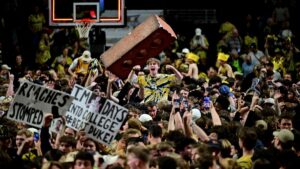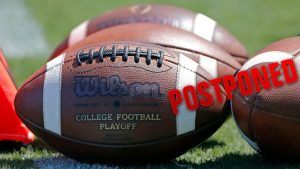There’s a lot of buzz on all the sports channels about banning Court Storming thanks to a couple of incidents involving high-profile players. Basically, a team wins a game and the fans storm onto the court to celebrate. This often leaves the players on the losing side in a dangerous situation as they attempt to dodge the excited, and often inebriated fans.
The sports pundits are all talking about banning court storming and wagging their fingers at the dangerous situation. It’s bad. It should stop. Golly gee, aren’t they all Dr. Einstein. Thanks for the heads-up on the situation.
Court Storming is Largely Banned
Almost every professional sports league has rules against storming the field or court. Most college conference implement heavy fines on schools where court storming takes place. The ACC is the only exception.
There are generally dividers to keep fans from doing it although these are easily bypassed. Almost every school has security officials stationed at the game to prevent court storming.
It continues to happen on a regular basis all across the country. Let’s not even talk about the celebrations that happen on the streets which are even more dangerous.
How to Stop Court Storming
The question is not if court storming is dangerous, it’s how to stop it. I’ve watched and read the pundits complain about it during almost every sports show and article I’ve read in the last few weeks. Rarely do I find anyone talking about the enforcement issue. How do we stop court storming? If thousands of people want to rush onto the court, it’s not easy stop.
Arresting people is difficult when you’ve got so many storming the court and relatively little security available to do it. You can fine people, ban them from attending, even put them in jail for a few days but that’s a big strain on the system and costs money.
Sure, you can post an army of security people, horses, dogs, and all the rest. That is moderately effective although at a football game with nearly a hundred thousand people in the stands, good luck. The problem is you cannot possibly hire that kind of security for every sports events. Some of these school make a huge amount of money from their athletic programs but many do not.
What’s the Answer?
I’m not sure there is a good answer to this problem. I think extra security, barriers, and penalties for those that do engage in court storming is a good idea. I’d like to see more security in these situations but I’m not sure you can stop a mob of people from doing what they want, often alcohol infused people.
Conclusion
My biggest problem with this entire discussion is that most people aren’t even talking about the solution. They just want to ban court storming without thinking through the process of doing so. We all understand the problem, how about we start talking in a meaningful way about how to implement it.
Tom Liberman

